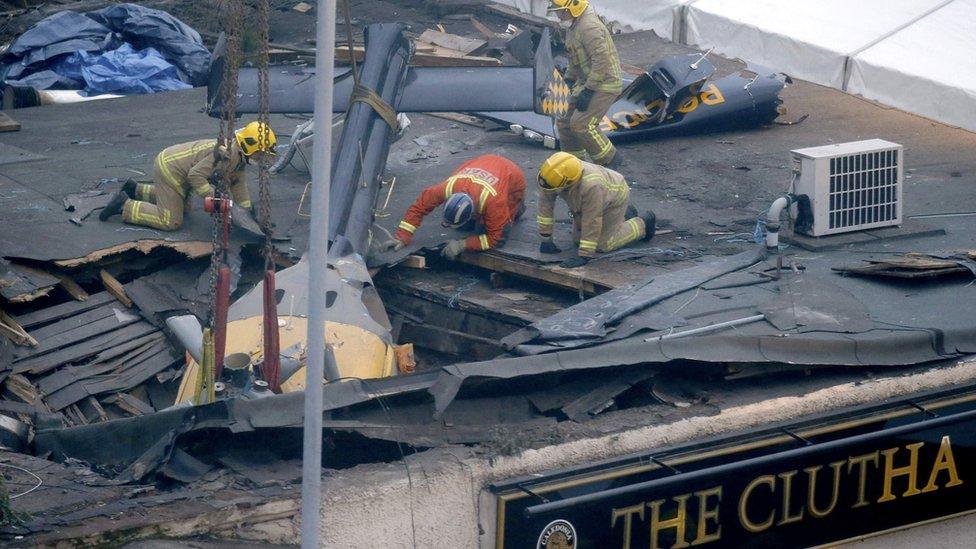Clutha crash: Pilot David Traill "trusted implicitly" by his crew
- Published
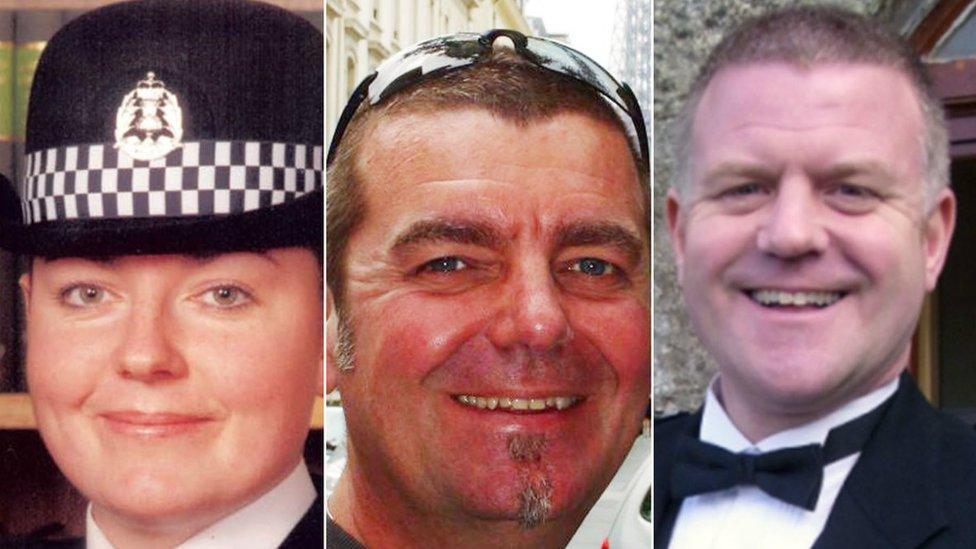
PC Kirsty Nelis, Capt David Traill and PC Tony Collins were killed in the Clutha helicopter crash
Two police officers killed in the Clutha helicopter crash "trusted implicitly" the pilot blamed for their deaths, according to their families.
PCs Tony Collins and Kirsty Nelis were on the aircraft when it crashed into the Glasgow pub on 29 November 2013.
A sheriff ruled that the crash happened because pilot David Traill "took a chance" and ignored fuel warnings.
Mark Nelis, the widower of PC Nelis, said the ruling had not changed his opinion of Captain Traill.
He said the sheriff's findings were "very disappointing" and he called for a fresh independent report by the Air Accidents Investigation Branch (AAIB).
The tragedy claimed the lives of Captain Traill, 51, PC Collins, 43, PC Nelis, 36, and seven customers who were in the Clutha Vaults pub.
Following a fatal accident inquiry earlier this year, Sheriff Principal Craig Turnbull found that Capt Traill ignored five fuel warnings he received during the flight.
He said it was a "conscious decision" that had "fatal consequences" for the 10 people who died.
However, in a statement following the sixth anniversary of the crash, Mr Nelis and PC Collin's widow, Lucy, paid tribute to Capt Trail.
Ms Collins said her husband, a police observer, trusted the pilot and regarded him as a "diligent and skilled professional".
The conclusion of the FAI "has not changed mine or my family's confidence and faith in him", Mr Nelis added.
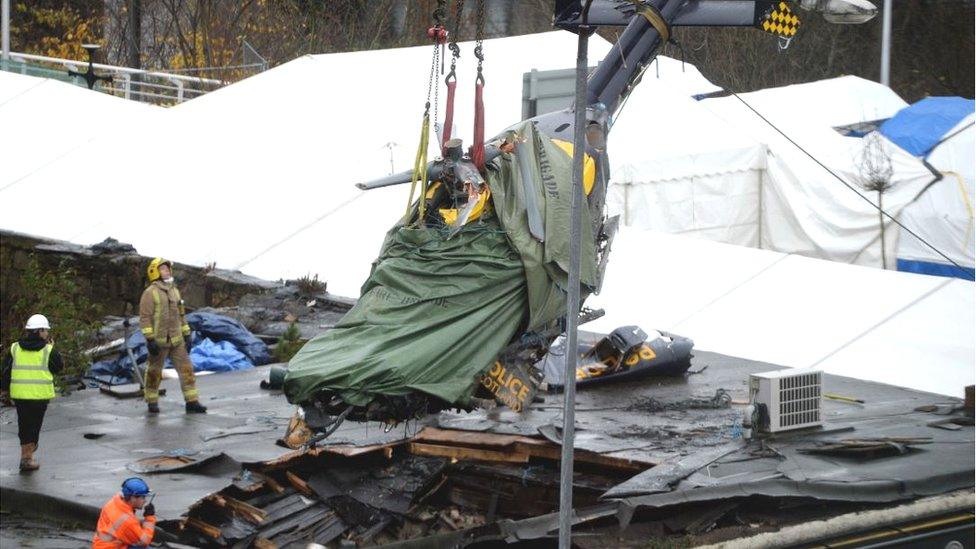
Ten people were killed in the tragedy on 29 November 2013
He said he found the conclusion of the sheriff "surprising" after evidence was heard about problem fuel readings on the helicopter prior to the crash.
Mr Nelis went on to say that the AAIB should provide a "fresh independent report" and release all forms of their report as it developed.
"The first draft report issued by the AAIB was sent to interested parties, including the helicopter owners and manufacturers, prior to its publication," he said.
"The report was finally released over four months late and had been amended on a number of key points. We have not been made aware of why it was changed or what contributions were made to it.
"We, as a family, have been left with a sense of frustration by the outcome of this inquiry, in particular with the AAIB report and with the Sheriff Principal's determination and criticism of the pilot."
The AAIB said it stood by its final report, external.
Gary Arthur, 48; Joe Cusker, 59; Colin Gibson, 33; Robert Jenkins, 61; John McGarrigle, 58; Samuel McGhee, 56; and Mark O'Prey, 44, all Clutha customers, also died when the helicopter hit the pub. Another 31 people were injured.
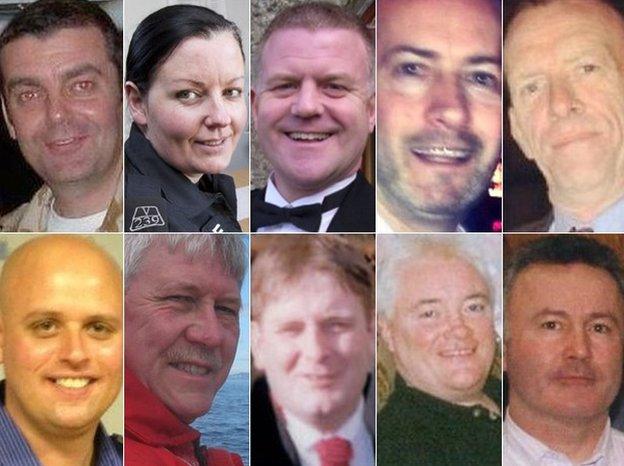
(Top: L to R) David Traill, PC Kirsty Nelis, PC Tony Collins, Gary Arthur, Samuel McGhee (Bottom: L to R) Colin Gibson, Robert Jenkins, Mark O'Prey, John McGarrigle, Joe Cusker
Ms Collins said she did not want to take part in the FAI as she would have found it "extremely distressing" but she wanted to highlight her husband's trust in his pilot.
"He trusted Dave implicitly as the hugely experienced and skilled pilot he was," she said. "I feel this important information that Tony would have wanted me to share."
Earlier this month Capt Trail's fiancee, Dr Lucy Thomas, described the sheriff's findings as "distressing and incomprehensible".
She said the manufacturer's maintenance manual incorrectly said there was a three to four-minute flameout time before the helicopter would lose both engines, but in reality he only had 32 seconds to make decisions and respond to the issue.
"That 32 seconds ended in tragedy and the loss of his and nine other valuable lives," she added.
Dr Thomas said the determination did "no justice to the memories" of the nine other people killed in the crash or to the "memory and reputation of Dave Traill".
"It insults the intelligence of those who know of the evidence presented at the inquiry and are aware of the content of the initial AAIB report," she said.
New footage from the Crown Office shows the aftermath of the helicopter crash
They are not the first families to raise concerns about the findings of the FAI.
Speaking shortly after the FAI determination was published, Ian O'Prey, who lost his son Mark in the tragedy, said he was "really angry" and that Capt Trail had been made a "fall guy".
The Clutha's owner, Alan Crossan, also expressed "shock and disappointment" at the report and how "brutal" it had been towards Capt Traill.
In his findings, external, Mr Turnbull said there was "no doubt" that the crash had happened because the helicopter's engines "flamed out" due to a lack of fuel.
The fuel supply tanks had been depleted because Capt Traill had failed to ensure that at least one of the aircraft's fuel transfer pump switches was on.
"The central question for the inquiry is why did that happen?" Sheriff Turnbull said.
"The answer is a simple one. Capt Traill ignored the low fuel warnings he received."
A spokeswoman for the Judicial Office for Scotland said the court paid "careful regard" to all the material placed before the Fatal Accident Inquiry and that its findings were available to read in full , externalon the Scottish Courts website.
- Published30 October 2019
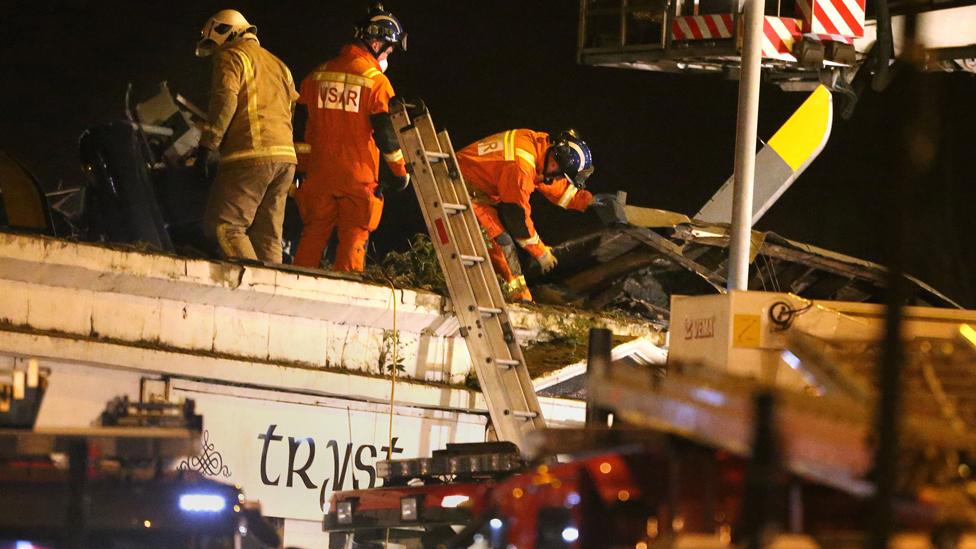
- Published30 October 2019
